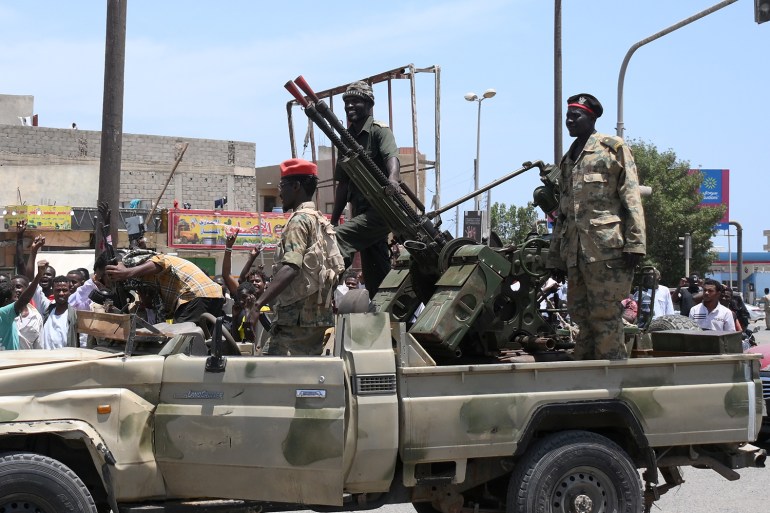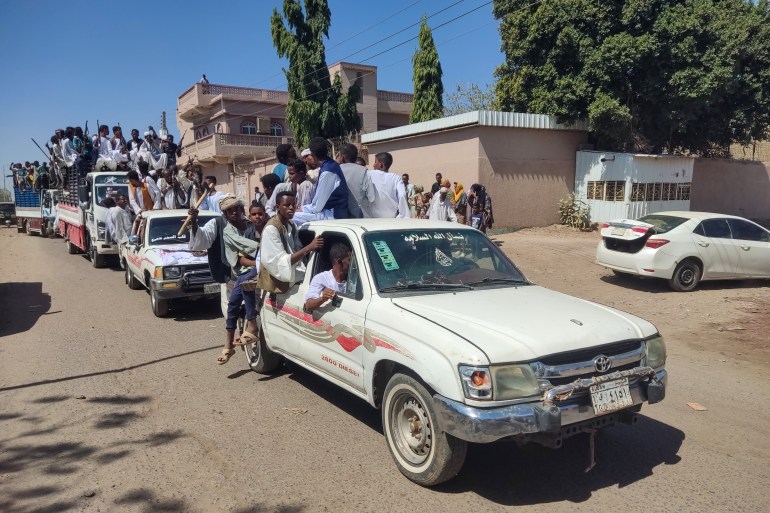On March 12, the army recaptured the national radio and television building in Omdurman, Sudan’s second largest city and one-third of the national capital region.
The victory came weeks after the army broke an RSF siege to retake a few neighbourhoods in Omdurman.
“I wouldn’t be super optimistic, because it’s one thing to take over territory and it’s quite another to hold on to territory,” said Hagar Ali, an expert on military-civilian relations in Sudan and a PhD candidate at the German Institute for Global and Area Studies.
Despite the caution, the army’s recent victories do seem to cast doubt over the RSF’s ability to conquer the entire country, which had seemed likely after it captured Gezira state in December.
Losing the vital breadbasket state and relief hub was a major blow to the army. It raised serious questions about its ability to protect civilians from the RSF, a group accused of atrocities such as summary killings, sexual violence and armed robberies.
But the army’s recapture of the radio and television station is restoring some faith in its capabilities.
Controlling the narrative
Taking the national radio and television is of particular significance because it is the building from which military leaders have historically announced their coups to the nation.
It could now serve as a useful tool to aid the army’s war effort, experts and Sudanese commentators told Al Jazeera.
A Sudanese journalist in River Nile state, who asked not to be identified for fear of reprisals from the army, believes members of Sudan’s Islamic movement – who ruled for 30 years under former President Omar al-Bashir – will try to control radio and television to spread their narrative of the war.
“At the start of the war, the army lacked an extensive media campaign, at least compared to the RSF which made use of the media sphere to support their war. All attention is now on how the army will use the radio and television building,” they told Al Jazeera.
“I think [al-Bashir-era] officials will certainly participate in controlling the content,” the journalist added.
Since war erupted between the army and the RSF in April 2023, Bashir-era figures have re-emerged to support the army’s war effort. Members of Sudan’s Islamic movement control the finance ministry and are believed to hold sway in the foreign ministry.
Many have reportedly aided recruitment campaigns and mobilised militias to fight alongside the army.

The fall of Gezira also helped the recruitment effort as thousands of young men – and some children – took up arms in self-defence or joined army recruitment camps to deploy against the RSF.
Fighting for an advantage
The military is still fighting from a significant disadvantage despite its recent victories, according to Ali.
In cities like Khartoum, she said, the RSF is more mobile and able to hide in alleyways, homes and buildings to avoid the army’s air strikes.
In vast open regions like Darfur – which is mostly controlled by the RSF – army aircraft have a clearer view of targets, Ali said, but they are also clear targets for anti-aircraft weapons.
Jonas Horner, an expert on Sudan who has worked with various think tanks such as the International Crisis Group, was more optimistic about the army’s chances.
“My impression is that there is momentum here – and my other accompanying sense is that it is in large part due to a boost in troops and technology that appears to be coming from Iran because the army can’t get it from elsewhere,” he told Al Jazeera.
The weapons Horner was referring to include Iranian drones. He also speculated that al-Bashir-era figures mobilised fighters from a similar ideological background to battle the RSF alongside the army.
“Many of the fighters battling the RSF are highly motivated Islamist forces seeking to reclaim Sudan. That ideological motivation counts for a lot next to those who are there for pay, as many RSF fighters are,” Horner told Al Jazeera.
Counteroffensive
The Sudanese army’s recent victories could also be the zenith of the army’s battlefield success, according to Hamid Khalafallah, a Sudanese analyst and PhD candidate at the University of Manchester.
He is not optimistic that the army can make significant gains against the RSF.
“I’m not sure they have the capabilities to do much more. The radio and television building is huge for them, but it’s not a city,” he told Al Jazeera, of speculation that the army is planning to launch a counteroffensive on Wad Madani, the capital of Gezira.

Khalafallah added that the RSF is spread across Gezira, where an internet blackout – that civilians blame on the RSF – makes documenting human rights abuses by the paramilitary difficult.
The RSF has reportedly killed hundreds of civilians in Gezira while looting homes and stealing vehicles. They have also attacked farmers and gang raped women, according to local activists.
RSF leader, Mohamad Hamdan “Hemedti” Dagalo, claims “rogue” elements in the RSF are committing abuses in Gezira, but that reports are exaggerated.
Another Sudanese journalist who asked Al Jazeera not to disclose their name for fear of reprisal from the army, said most people are looking for any sign that the army can protect them.
They acknowledged that despite the army relying on Islamic figures and fighters from the al-Bashir regime, people would feel more secure living under military rule.
“People around me prefer the military as opposed to the RSF.
“But in the end, they just hope that [Sudan] can return to peace and security one day.”
